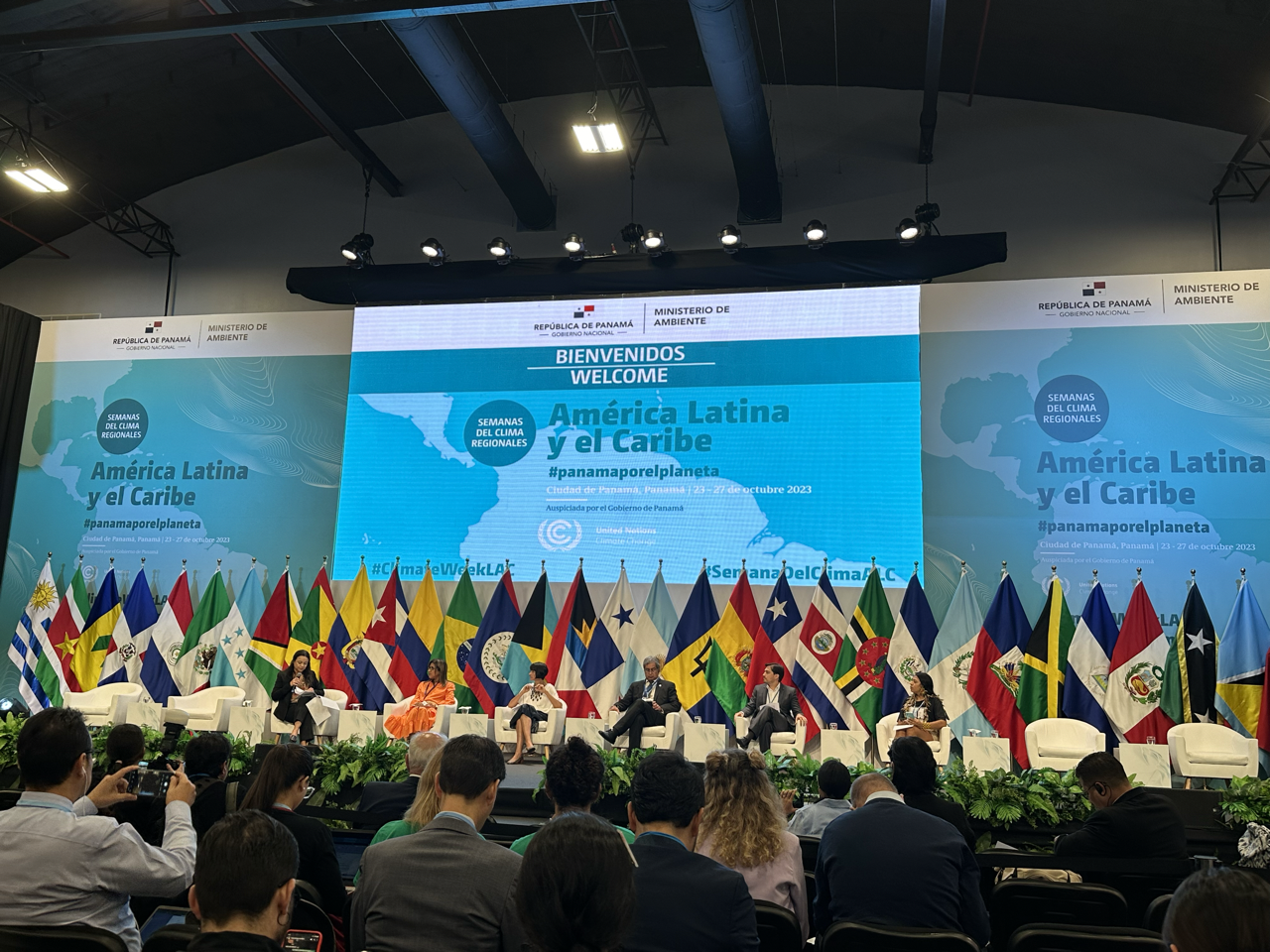
Latin America and the Caribbean Climate Week, High level GST and Ministerial High Level Segment, Andrea Meza – Deputy Executive Secretary of the UNCCD, Costa Rica, Diana Laguna – Vice Minister of Environment of Panama, Susana Muhamad – Minister of Environment and Sustainable Development of Colombia, Kishan Kumarsingh – Head, Multilateral Environmental Agreements, Ministry of Environment, Trinidad and Tobago, Camilo Sanchez – CEMEX and Gabriele Helen de Oliveira – representative of the indigenous youth of Brazil.
Photo: GCHA
By Milena Sergeeva, GCHA Liaison Officer for Latin America and the Caribbean
Each year in the lead up to the annual UN climate negotiations at the end of the year – this year, COP28, hosted by the United Arab Emirates – several regions host regional climate weeks. Regional climate weeks are an important opportunity to cultivate regional alignment and momentum ahead of COP, and can help bring a stronger regional voice to the international table at COP.
The Latin America and the Caribbean Climate Week (LACCW2023), hosted by Panama from October 23-27 was a turning point for health and climate, with multiple health events, and discussion of health by some stakeholders throughout the week.
Health permeated the dialogues of different sectors at LACCW2023, underlining its inextricable link with climate action. The conference, where diverse voices, disciplines and perspectives converged of civil society, academia and governments, wove health into formal discussions and side events. Health was present not only through Thematic Track 4, which addressed the intersection of society, livelihoods, health and economies, but also in key areas such as transport, food, urban planning, waste management, communication and the critical issue of fossil fuels.
The Forum of Ministers’ statement resonated with a clear message: the path towards mitigating climate change and safeguarding our collective health requires cross-sector collaboration and regional cooperation, guided by the “One Health” approach. This unifying approach considers the health of humans, animals and the environment as an interconnected whole, essential for the design of effective policies.
The proposed creation of a scientific-regulatory Panel for the management of chemicals and waste highlighted the need to strengthen the science-policy interface, ensuring that science is the lighthouse that guides environmental regulations.
Financing and Justice in the Energy Transition: The Voice of Latin America
Looking ahead to the upcoming COP28, Latin America is raising its voice for more robust and accessible financing and a fair energy transition that takes into account the most vulnerable populations and biodiversity, as highlighted in a recent article in El País. The region, rich in biodiversity and playing a vital role in the global fight against climate change, demands greater attention to the specific needs of its countries and peoples, especially in terms of climate financing that supports both mitigation and adaptation.
Integrating health into climate action resonates with these demands, as an equitable energy transition must consider the well-being and livelihoods of vulnerable populations and biodiversity. Likewise, health is a strong and accelerating argument to address the contentious issues of the region, such as the necessary gradual elimination of fossil fuels, the elimination of poverty, and access to basic goods and services. Protecting health also emphasizes the importance of including all sectors of society, especially indigenous peoples, women and youth, in the climate conversation.
In this context, Colombia affirmed its leadership in ambition for climate and health in the region, advocating for putting people at the center of the negotiations. Colombia called for a unified climate negotiating position for the Latin American and Caribbean region, while recognizing the differences between countries regarding their position on the elimination of fossil fuels.
Colombia well recognizes the linkages between the burning of fuels with the impacts both on the climate and on people’s health, and is indeed tied for the highest scoring country on GCHA’s recently released Clean Air NDC Scorecard. The findings of the Clean Air NDC Scorecard were presented at an Action Hub event at LAC Climate Week, with the Colombian Ministry of the Environment on hand to discuss the country’s focus on climate, clean air, and people’s health.
Other events with a health focus included “Strengthening climate resilient health systems: a call to collective action”, presented by PAHO, Ministry of Health – Panama, Ministry of Health – Argentina, CCAC, Rockefeller Foundation, Clinton Foundation and UNFCCC – available on YouTube; and a side event, showing research on Mental Health for policy advocacy from the University of the West Indies in the Caribbean.
Towards a Sustainable and Healthy Future
Latin American and Caribbean Climate Week (LACCW) highlighted that health and well-being are essential pillars of the climate agenda. The adoption of healthy approaches in energy, urban planning, nutrition and transportation policies represents only a fraction of the advances that the region is willing to implement. With particular challenges in terms of financing and just transition, regional synergy will be decisive in shaping the global dialogue at COP28, and even more so in the projection towards COP30 in Brazil, where civil society is already organizing efforts to ensure that its voices are heard and their proposals considered.

